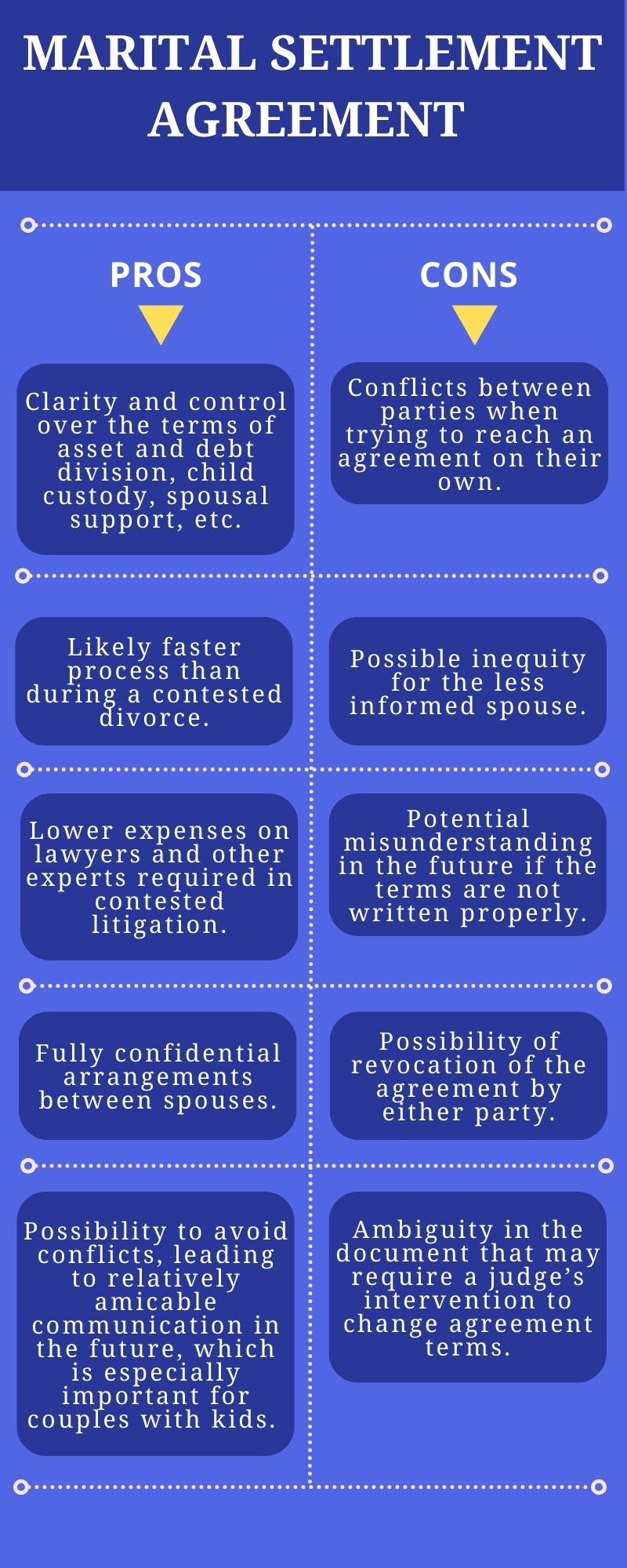What Is a Marital Settlement Agreement in Divorce?
A Marital Settlement Agreement, or MSA, is a written contract between spouses regarding all crucial matters of their divorce. The document typically includes spouses’ decisions about the distribution of property and financial assets, so some people call it a property settlement agreement or a divorce financial settlement. However, these are only some of the aspects outlined in the agreement. Spouses with minor kids also include provisions on child custody and support, and there may be separate regulations on alimony if required.
Many couples perceive an MSA as a standard divorce agreement that allows them to avoid the complexities and extended procedures of a contested marriage dissolution. Besides, with an MSA in place, it is possible to save money on full-scope lawyer involvement in the course of a divorce.
If you are going to create a Marital Settlement Agreement and want to know how a divorce settlement works, whether it is possible to draft it without lawyers, and if there are any risks of a DIY settlement, check the information below.
How Does Divorce Settlement Work?

Divorce settlement involves discussing and agreeing on the division of assets and responsibilities between divorcing spouses. Preparing a settlement is the best way to make the whole divorce process faster, cheaper, and simpler.
When spouses are going to end their marriage, they may not be initially on amicable terms about such a life change. However, when discussing different divorce-related matters, parties may understand that acting cooperatively is more advantageous than bringing their disputes to the court.
Sometimes they reach this decision themselves; in other cases, their mediator or lawyers may suggest creating a Marital Settlement Agreement. Writing and signing an MSA is an effective method to turn an initially contested divorce into an uncontested one, which implies less money and time spent.
Spouses should study the state laws very attentively, use legal resources or online guides, communicate openly, and stay flexible during negotiations. If any legal matter still seems unclear, they may schedule a consultation with an attorney. It is easier to prevent potential disputes at this point than to ask for MSA modification later on.
Since a Marital Settlement Agreement is often used as a basis for a divorce decree, it must be detailed. Usually, couples elaborate on:
- Division of assets and debts
- Specific terms regarding child custody and support
- Spousal support settlements
- Tax implications
- Health and insurance policies
- Case-unique matters
Who Gets What in a Marital Agreement?

When writing a Marital Settlement Agreement, spouses can determine themselves how their joint property will be divided, adhering to the state laws. The same refers to marital debts. In fact, this freedom is one of the major advantages of an MSA, since partners do not need to delegate decision-making concerning distributing assets to the court.
Usually, spouses seek fairness in asset division. However, it doesn’t always mean a 50/50 split. If you aren’t sure how to distribute your property justly and lay down your decisions in an MSA accurately, consider a consultation with a lawyer.
How Long Do I Have to Pay Divorce Settlement?

The duration of child support and alimony payments is usually clearly defined in a Marital Settlement Agreement approved by the court. Besides, an MSA contains regulations on the frequency of payments and the amounts.
The most common types of spousal support in terms of duration are:
- Temporary – for a set period.
- Permanent – may continue indefinitely but usually ends if an ex-spouse remarries or dies.
In most states, child support payments are legally mandated till the child reaches the age of 18. However, a non-custodial parent may have to pay longer if a kid has special needs.
What Happens After Divorce Settlement Agreement Is Signed?
A signed Marital Settlement Agreement becomes a legally binding contract. When both parties sign an MSA, they express their full consent with the terms outlined and their readiness to follow the property settlement agreement after divorce.
Next, a couple or their representatives have to submit it to the court for approval. After the judge checks the MSA for fairness and correspondence with the laws and signs it, the document is usually incorporated into the final divorce decree.

Is a Marital Settlement Agreement Legally Binding?
Yes, a Marital Settlement Agreement is a legally binding document once both spouses add their signatures to it and the court approves the agreement. If either party violates the terms of a division of property agreement, breaches settlements concerning child custody, or ignores other matters defined in the document, the other person can address the court for enforcement.
The non-compliant party may face different penalties for violation of the agreement provisions:
- Fines
- Community service
- Wage garnishment
- Property seizure
- Suspension of licenses
- Modifications of custody arrangements
Can a Judge Change a Divorce Agreement?

A judge can modify the terms of a marital settlement agreement that spouses submit. If any decision seems unfair, the judge may suggest changes. Besides, the court will surely request alternations if spouses’ arrangements related to kids aren’t in the best interest of the child.
Can a divorce settlement be changed after the marriage is officially terminated? In fact, it can if either party’s life circumstances have substantially altered. For instance, if a non-custodial parent has lost a job, the sum of child support can be reduced. Besides, if either parent relocated, they may request changes to custody or visitation terms.
To initiate a modification, the party has to file a motion with a court, including solid evidence. The judge will review the request and determine whether the circumstances justify altering the agreement.
Can You Write Your Own Divorce Agreement?

Generally, you can write your own Marital Settlement Agreement, but it is very important to formulate your decisions carefully. There are some recommendations that can be useful if you choose a DIY option:
- Talk to your spouse once again to ensure you both understand the importance of an MSA, its implications, and the consequences of violating the contract.
- Learn the legal requirements of your state to be sure that your contract meets legal standards and won’t be rejected by the court.
- Be clear and accurate about the terms of property and debt division, child custody and support, alimony, and all other important matters. Avoid ambiguity.
How to Write a Divorce Agreement?

To make a simple divorce agreement, take the following steps:
- Collect personal and financial information so all important details are at hand.
- Check out the court website to see if the official form is available. Start completing the document, indicating the full names of both parties and data related to marriage.
- Clearly list all marital assets and debts and how you want to split them.
- Outline the agreed-upon arrangements for child custody and support.
- Address spousal support – the sum, the frequency of payments, and the duration.
- Clarify all other matters that are relevant in your situation – health insurance, caregivers for pets, etc.
- Mention if any modifications are possible in the future and under what circumstances.
- Review your agreement and ask the other party to do so as well.
- Sing the contract and submit it to the court.
Divorce Settlement Agreement Example
In some states, the MSA is a mandatory divorce form that must be filed with the court. Often, spouses can obtain a template or a blank form from the court clerk or search for it on the official website.
You can also look for a template for divorce agreement on other reliable websites, as many offer such adjustable forms. If you decide to use a template from the web, make sure it meets the legal requirements of the state so that it will not be rejected by the court.
Here is an example of what an MSA may look like and what terms it can cover.
Does a Settlement Agreement Need to Be Notarized?

Regulations concerning the notarization of divorce agreement papers may vary across jurisdictions, so it is reasonable to double-check this aspect with the local court. In some states, spouses have to notarize a signed settlement agreement; in others, they can submit it to the court without notarization.
Online Divorce Made Simple
Complete your divorce forms through a simple, guided process designed for your state. No lawyers, no court stress.







